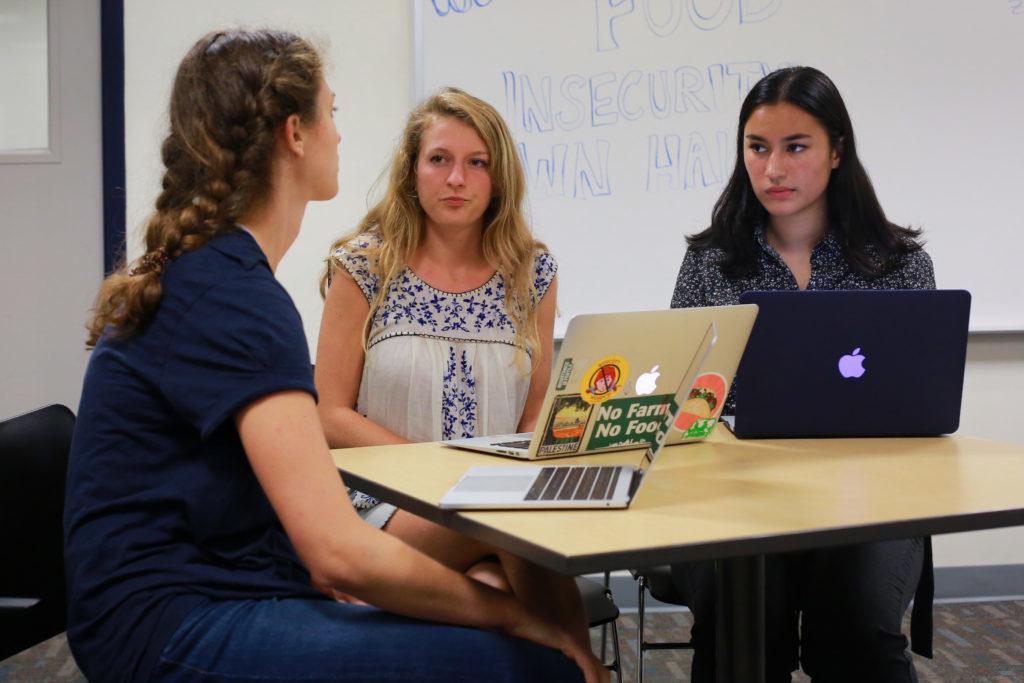More than 30 students and staff gathered in the Marvin Center Wednesday to discuss a long-running concern among students: food insecurity.
Student Association leaders and leaders of The Store, GW’s student-run food pantry, hosted a town hall for students to discuss their experiences with food insecurity on campus. The event, which ran for about an hour, included time for students to publicly comment about their experiences with food insecurity and allotted a portion of the town hall for students to break off into small groups to discuss ways to combat the issue.
Student Association President Ashley Le said during public comment that after immigrating to the United States eight years ago, she spent five years living on food stamps and had $5 to pay for food every day. Since arriving on campus, she said that learning to live without federal assistance has been a “challenge.”
“Food security has really been something that is important to me,” Le said. “It has impacted the way I grow physically, emotionally and mentally.”
Le said she wants conversations about food insecurity to be an “educational experience” for both students and officials.
“This isn’t just something that we hear from The Washington Post or from The Hatchet,” Le said. “This is something that every single one of us in this room right now and a lot more students in the student body is experiencing.”
Fourteen students, including the event’s four organizers, spoke during public comment at the event, where discussions largely focused on the affordability of GW’s dining plan and students’ ability to find low-cost, healthy options.
Senior Rebecca Bizzarri, the former chief of staff for the SA Senate, said that while she “admires” student initiatives like The Store that work to alleviate food insecurity, it is “off-putting” to see students running the programs rather than officials because “students are the ones that have to take on the burden of feeding their classmates.”
“It’s really a question for the administration or this University,” Bizzari said. “When we put students in these positions where they have to advocate for their peers in order to get at the very basic level – food – that’s a problem.”
Sen. George Glass, U-at-Large, said that since the University overhauled the dining plan in February to allocate dining dollars based on whether or not students have a kitchen, some students have been put in a difficult position because they can’t or don’t know how to cook. Glass said he now lives in Munson Hall and receives less money than he did last year living in a freshman residence hall without a kitchen in his room.
“The problem is that I have no idea how to cook, and I think for a lot of students, that’s a very difficult thing to do,” Glass said. “No one in my dorm or room can cook so we’re getting significantly less money and we don’t know what to do with it.”
The Board of Trustees boosted the amount of money on students’ GWorld in February amid growing concerns that students have had insufficient funds to pay for food throughout the year. Students without kitchens now have $4,600 per year to spend on food, while students living with kitchens in their residence hall rooms have $2,800.
Senior Hannah Grosvenor, the vice president of The Store, said students run out of money on their GWorld account because “basic needs,” like printing and laundry, come from the same account students use to pay for food.
Grosvenor said that while it’s “nice” that students are receiving more money for food after officials made changes to the dining plan, students also have to take out more loans to offset the cost of attending GW.
“It’s just a compounding issue where I feel like I’m drowning and I’m not even treading water anymore,” Grosvenor said. “Without The Store, I would have had to drop out of GW but I’m not going to let something stop me from doing what I want to do.”





